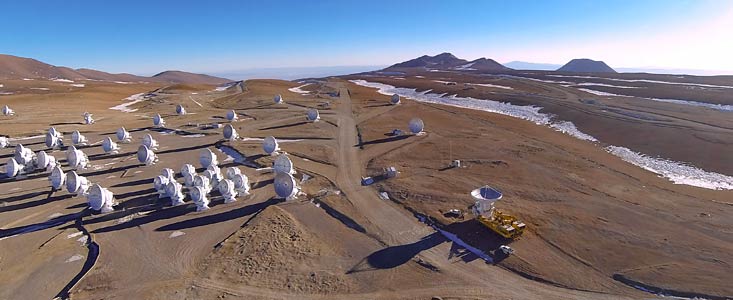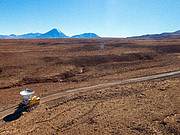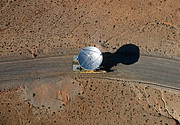Annuncio
Final ALMA Antenna Arrives on Chajnantor Plateau
16 Giugno 2014
The final antenna for the Atacama Large Millimeter/submillimeter Array (ALMA) project has been taken up to the high-level site at the ALMA Observatory, 5000 metres above sea level. Its arrival completes the complement of 66 ALMA antennas on the Chajnantor Plateau in the Atacama Desert of northern Chile — where they will in future work together as one giant telescope.
The 66th ALMA antenna was transported to the Array Operations Site (AOS) on Friday 13 June 2014. It had been delivered to the ALMA Observatory for final testing in October 2013 (eso1342).
The 12-metre diameter dish is the 25th and final European antenna to be transported up to the Chajnantor Plateau on . It will work alongside its European predecessors, as well as 25 North American 12-metre antennas and 16 East Asian (four 12-metre and twelve 7-metre) antennas.
The global ALMA collaboration is the largest ground-based astronomical project in existence. The final European antenna was manufactured by the European AEM Consortium [1], as part of the largest ESO contract so far covering the design, manufacture, transport and on-site integration of the 25 antennas.
The ALMA Observatory was inaugurated by the President of Chile, Sebastián Piñera, in March 2013. This signified the completion of all of the major systems of the giant telescope and the formal transition from a construction project to a fully-fledged observatory.
“This marks the end point of many years of delivering state-of the art high-technology systems and components to Chajnantor and is an important milestone for the ALMA project. All ALMA antennas are now available to be integrated into the operations,” says Wolfgang Wild, the European ALMA Programme Manager.
ALMA probes the Universe using light with millimetre and submillimetre wavelengths, between infrared light and radio waves in the electromagnetic spectrum. Light at these wavelengths originates from vast cold clouds in interstellar space and from some of the earliest and most distant galaxies in the Universe. The telescope will provide astronomers with a window into the mysterious cold Universe where secrets of our cosmic origins are waiting to be discovered.
Notes
[1] The AEM Consortium is composed of Thales Alenia Space, European Industrial Engineering, and MT-Mechatronics.
More Information
ALMA, an international astronomy facility, is a partnership of Europe, North America and East Asia in cooperation with the Republic of Chile. ALMA construction and operations are led on behalf of Europe by the European Southern Observatory (ESO), on behalf of North America by the National Radio Astronomy Observatory (NRAO), and on behalf of East Asia by the National Astronomical Observatory of Japan (NAOJ). The Joint ALMA Observatory (JAO) provides the unified leadership and management of the construction, commissioning and operation of ALMA.
ESO is the foremost intergovernmental astronomy organisation in Europe and the world’s most productive ground-based astronomical observatory by far. It is supported by 15 countries: Austria, Belgium, Brazil, Czechia, Denmark, France, Finland, Germany, Italy, the Netherlands, Portugal, Spain, Sweden, Switzerland and the United Kingdom. ESO carries out an ambitious programme focused on the design, construction and operation of powerful ground-based observing facilities enabling astronomers to make important scientific discoveries. ESO also plays a leading role in promoting and organising cooperation in astronomical research. ESO operates three unique world-class observing sites in Chile: La Silla, Paranal and Chajnantor. At Paranal, ESO operates the Very Large Telescope, the world’s most advanced visible-light astronomical observatory and two survey telescopes. VISTA works in the infrared and is the world’s largest survey telescope and the VLT Survey Telescope is the largest telescope designed to exclusively survey the skies in visible light. ESO is the European partner of a revolutionary astronomical telescope ALMA, the largest astronomical project in existence. ESO is currently planning the 39-metre European Extremely Large optical/near-infrared Telescope, the E-ELT, which will become “the world’s biggest eye on the sky”.
Links
Contatti
Wolfgang Wild
European ALMA Programme Manager, ESO
Garching bei München, Germany
Tel: +49 89 3200 6716
Email: wwild@eso.org
Stefano Stanghellini
ALMA Antenna Project Manager, ESO
Garching bei München, Germany
Tel: +49 89 3200 6570
Email: sstanghe@eso.org
Lars Lindberg Christensen
Head of ESO ePOD
ESO ePOD, Garching, Germany
Tel: +49 89 3200 6761
Cellular: +49 173 3872 621
E-mail: lars@eso.org
A proposito dell'annuncio
| Identificazione: | ann14048 |
Our use of Cookies
We use cookies that are essential for accessing our websites and using our services. We also use cookies to analyse, measure and improve our websites’ performance, to enable content sharing via social media and to display media content hosted on third-party platforms.
ESO Cookies Policy
The European Organisation for Astronomical Research in the Southern Hemisphere (ESO) is the pre-eminent intergovernmental science and technology organisation in astronomy. It carries out an ambitious programme focused on the design, construction and operation of powerful ground-based observing facilities for astronomy.
This Cookies Policy is intended to provide clarity by outlining the cookies used on the ESO public websites, their functions, the options you have for controlling them, and the ways you can contact us for additional details.
What are cookies?
Cookies are small pieces of data stored on your device by websites you visit. They serve various purposes, such as remembering login credentials and preferences and enhance your browsing experience.
Categories of cookies we use
Essential cookies (always active): These cookies are strictly necessary for the proper functioning of our website. Without these cookies, the website cannot operate correctly, and certain services, such as logging in or accessing secure areas, may not be available; because they are essential for the website’s operation, they cannot be disabled.
Functional Cookies: These cookies enhance your browsing experience by enabling additional features and personalization, such as remembering your preferences and settings. While not strictly necessary for the website to function, they improve usability and convenience; these cookies are only placed if you provide your consent.
Analytics cookies: These cookies collect information about how visitors interact with our website, such as which pages are visited most often and how users navigate the site. This data helps us improve website performance, optimize content, and enhance the user experience; these cookies are only placed if you provide your consent. We use the following analytics cookies.
Matomo Cookies:
This website uses Matomo (formerly Piwik), an open source software which enables the statistical analysis of website visits. Matomo uses cookies (text files) which are saved on your computer and which allow us to analyze how you use our website. The website user information generated by the cookies will only be saved on the servers of our IT Department. We use this information to analyze www.eso.org visits and to prepare reports on website activities. These data will not be disclosed to third parties.
On behalf of ESO, Matomo will use this information for the purpose of evaluating your use of the website, compiling reports on website activity and providing other services relating to website activity and internet usage.
Matomo cookies settings:
Additional Third-party cookies on ESO websites: some of our pages display content from external providers, e.g. YouTube.
Such third-party services are outside of ESO control and may, at any time, change their terms of service, use of cookies, etc.
YouTube: Some videos on the ESO website are embedded from ESO’s official YouTube channel. We have enabled YouTube’s privacy-enhanced mode, meaning that no cookies are set unless the user actively clicks on the video to play it. Additionally, in this mode, YouTube does not store any personally identifiable cookie data for embedded video playbacks. For more details, please refer to YouTube’s embedding videos information page.
Cookies can also be classified based on the following elements.
Regarding the domain, there are:
- First-party cookies, set by the website you are currently visiting. They are stored by the same domain that you are browsing and are used to enhance your experience on that site;
- Third-party cookies, set by a domain other than the one you are currently visiting.
As for their duration, cookies can be:
- Browser-session cookies, which are deleted when the user closes the browser;
- Stored cookies, which stay on the user's device for a predetermined period of time.
How to manage cookies
Cookie settings: You can modify your cookie choices for the ESO webpages at any time by clicking on the link Cookie settings at the bottom of any page.
In your browser: If you wish to delete cookies or instruct your browser to delete or block cookies by default, please visit the help pages of your browser:
Please be aware that if you delete or decline cookies, certain functionalities of our website may be not be available and your browsing experience may be affected.
You can set most browsers to prevent any cookies being placed on your device, but you may then have to manually adjust some preferences every time you visit a site/page. And some services and functionalities may not work properly at all (e.g. profile logging-in, shop check out).
Updates to the ESO Cookies Policy
The ESO Cookies Policy may be subject to future updates, which will be made available on this page.
Additional information
For any queries related to cookies, please contact: pdprATesoDOTorg.
As ESO public webpages are managed by our Department of Communication, your questions will be dealt with the support of the said Department.






